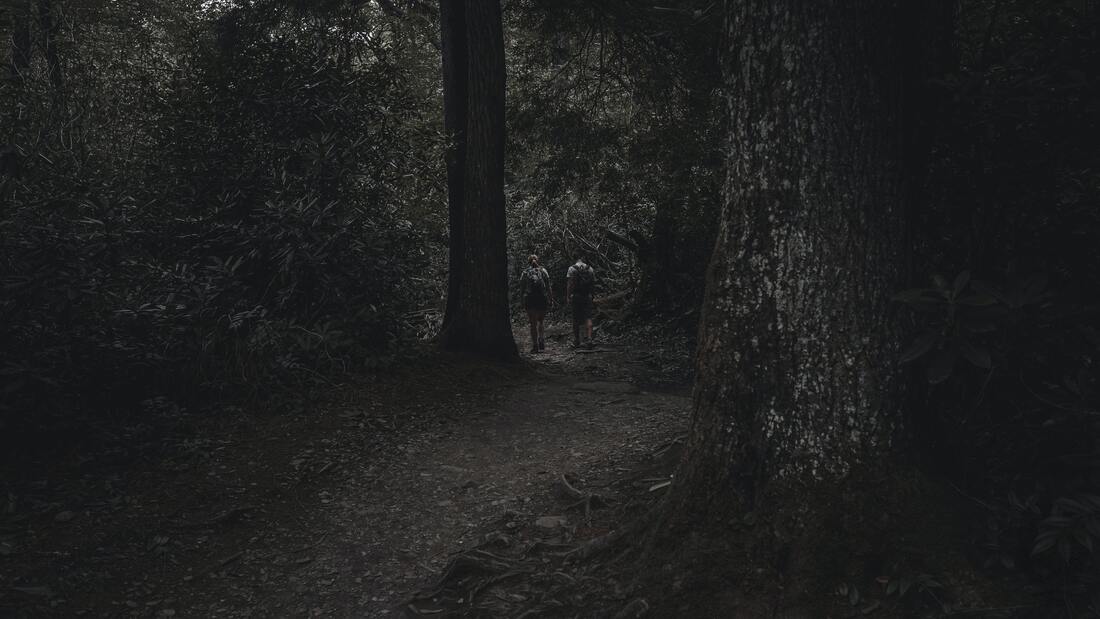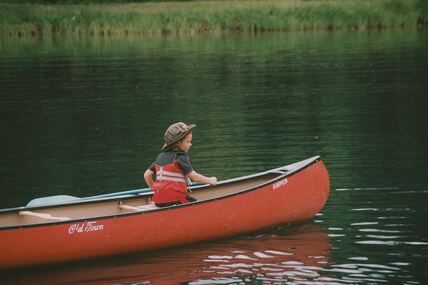by: Joel BatesIf it hadn’t been for the darkness they would have seen me crying and then I would have had to try to keep it together. Praise God for hiding places. Let me start from the beginning. Yet again, I was hiking late at night behind a troop of wilderness wanderers—this time missionaries-in-training, good people called to reach needy peoples. They had persevered and were descending the last ridge into a valley that would be our home during the 24-hour solo before the trip ended. Hiking in the dark was not new to our group, but as we ambled down the barely distinguishable path this night, a strange feeling came over me. I peered into the dark forest, but saw nothing there. Looking up, I saw a million brilliant stars floating in a jet-black expanse, but they did not illumine my way. I paused and heard only the sound of crunching gravel beneath the hikers’ feet. What was I sensing? My headlight beam created a hindering glare, so I shut it off. I momentarily became vulnerable to the darkness and whatever was out there. I saw nothing. I heard nothing. But, I knew something or someone was approaching, pursuing as we neared our destination. Unable to remain quiet, I tapped my co-leader on the shoulder and quietly shared, “We are not alone.” He looked at me with fascination, “Yes, I feel it, too!” I could see him grinning! “He is here,” I whispered. “The farther down the ridge we go and the darker the night, the more I feel Him.” Sometimes, when hiking at night through a thick, tangled woods, my imagination causes the hairs on the back of my neck to stick out and makes every shadow looks like a bear. I was familiar with that misconception, and this sensation was far from that. I had a giddy sense that the divine Creator of the world was behind us, beside us, and before us, enveloping us in supreme solitude with Him. I felt hidden away from the world and all its worries. Even though we were vulnerable, being hours away from any help if trouble should befall us, I felt secure and protected in God’s unmistakable presence. I was still marveling at and relishing the Lord’s presence when the group halted for a snack. So, as we sat on our packs and munched a granola bar, I could only think about Jesus sitting next to me. One of the sweet ladies in our group—a lady headed to impoverished parts of the world where she would join the suffering, dusty throng and, even more, become a living sacrifice, began to sing. Her voice was clear and sublime. Her words of praise poured forth and washed over me, and soon we all joined her in singing the familiar hymn. “Then I shall bow in humble adoration and there proclaim, ‘My God how great Thou art!’” My voice stalled out, choked with emotion, and the tears just started falling freely. I had often happily sung those words in church, but I had never allowed them to penetrate my façade to reveal the depths of my emotions. Fellow worshipers would surely have perceived such lack of control as weakness! In the darkness, no one saw my tears; I didn’t have to try to keep it together. That experience showed me that I need to grow, but until I do, I’m grateful for the darkness that shields me from expectations of others. I am grateful for the arms of Jesus that wrap around me when I’m sitting in the dark on some far away and forgotten trail with only the voices of other sojourning saints filling the space with praise. Praise God for hiding places! Did Paul feel this way as he and Silas sat in darkness late one night, deep in the heart of a Philippian dungeon? Acts 16 tells how these two missionaries, when faced with great adversity, chose to sing praises to the Lord. God responded by sending an earthquake, and then things got really exciting. The jailer, who thought his life was over, met Jesus, and the whole household found new life in Him! A dungeon seems like an unlikely place for a revival to break out, but Paul and Silas must have felt the intimate closeness of God in that dark place. Maybe they sang for joy because the great peril of their situation gave greater definition to their love. Maybe they praised because they were experiencing the overwhelming honor of having the presence of Almighty God with them in that place. Later in Paul’s life, he would write to the Roman church, “For I am sure that neither death nor life, nor angels nor rulers, nor things present nor things to come, nor powers, nor height nor depth, nor anything else in all creation, will be able to separate us from the love of God in Christ Jesus our Lord” (Rom 8:38-39). He might have added, “And no darkness will keep Him from us.” Funny how Jesus shows up to sit beside us in the most unlikely places. Often I sense Him in the vulnerable times because my heart is more attentive when the times are tough, like when I’m descending into a valley in the dead of night. Maybe you’re experiencing a dark time, or a vulnerable circumstance. Know that the Father is near, and it is in these moments where a little singing and a few tears may be the perfect response. “Surely the darkness shall cover me, and the light about me be night,
even the darkness is not dark to you; the night is bright as the day, for darkness is as light with you.” Psalm 139:11-12
0 Comments
by: Joel Bates Question: Why does God lead us on deliberate paths and then sometimes, when we’re nearly there, plant a wall? I angrily stewed on this question a couple weeks ago as I led yet another challenge expedition. I knew this trip would bring extra challenge because of our current drought. This fact was especially true in selecting an itinerary that led to a waterway where I could assign individual sites for the students to spend the 24-hour solo time planned near the end of the eight-day trip. Planning strategically would be essential. A week before the trip, I had been studying the map and discovered a valley I had never hiked through. The map markings indicated that a creek ran there, so a few days before my trip began, I set out to scout the area to see if it would be a suitable place for the solo time. As I hiked, I prayed that God would provide ample water despite the lack of rain, pleasant and spacious gravel beaches for each participant to erect his shelter, and a flat, wooded glade to center our basecamp. My first, exploratory steps followed a dry creek bed—not a good start—but as I continued, the gravel-bottom wadi firmed into a rock-bottom stream with delightfully fresh, cold, flowing water. Not only this, but a plethora of small curves in the creek created spots of gravel protruding down to the water’s edge, perfect for solo sites. So far so good! I hiked on to encounter a flat, thickly forested plateau that rose six feet above the creek. It was shaded and pleasant with very little undergrowth. I couldn’t have imagined a better place for the group’s sacred time with God. I sensed not only the Lord’s provision and purpose, but I felt His direct invitation to commune with Him there. Six teenage guys arrived on camp ready to face whatever came. I grew to appreciate the group’s “can do” attitude as they developed the necessary skills of navigation and campcraft. They all seemed to have a genuine faith in Christ that showed through their service and care for one another, even though the days were long, hot, and challenging. The whole time on the trail I kept thinking about the solo area that awaited us. One day spilled into another until we found ourselves near the end of the trip, standing upon a mountain with night setting in. I knew that pretty creek lay in the valley below, but there was a lot of distance and darkness to contend with before any rest would come. I trusted God’s invitation to meet Him there, but would the group persevere? For hours I followed as our struggling party descended the mountain and observed most members growing weary, casting aside all desire to press on to the destination. The leader of the day held the map and compass in his hands and the weight of the group on his shoulders. He knew his general location, but couldn’t pinpoint his position. I asked him if he knew where he needed to go. He indicated that he did, and I coached him to set a compass bearing and follow it. We were little more than a tenth of a mile from that sparkling, spring-fed stream after eight days of hot, arduous sojourning, and I was eagerly looking forward to refreshment that the solo time with God and my little, spring-fed stream promised. With compass in hand and a definite plan, the leader struck out. We began cutting cross-country as we followed the bearing. Waist-high weeds and brambles, increasingly thick foliage and dense ground cover met our every step. A little trail appeared ahead, giving momentary hope to the group, who were now dead on their feet and bitter about the bushwhacking. The young leader checked the glowing compass needle and kept moving into thicker, darker underbrush. When his followers protested, he stood his ground. “The trail does not follow the bearing,” he explained simply to pacify their dismay. So, we hiked onward and were soon forced to halt at a nearly impenetrable, 8’ hedge row wall of vines, thorns, and brambles.  Now bewildered, the leader looked back at me, and I could see the question on his face, despite the shadow his headlamp cast over it, “Should I go on?” “Stick to the bearing,” I urged. That was the right answer to give as the facilitator, but even I had my doubts. Should we try to hack, cut, and crawl our way through the solid barrier of vegetation? Our options were few, so into the scrub we went. Our progress was slow—clear a path, forge through, and then stand with the 50-pound packs on our backs while more path was cleared. I strained to hear that precious running water that I knew must be only yards away, but the drone of tree frogs, crickets, and mosquitoes drowned it out. Fatigue and misery in that muggy, painful, monotonous moment added to my guilt of having encouraged the young man to continue this way. How was I to know that our bearing to one of the most beautiful places in the Ozarks would be blocked with only a few strides left in the journey! Forced to halt, pushed back, knocked down, and undone when I was so sure God had invited us to commune with Him just beyond the wall, I felt a hot anger rise in me—an anger not over the wilderness, the bugs, or my waning strength, but an anger toward God. “Why, God, have You allowed us to come so far, to almost make it, only to have to contend with this wall?” Then I thought of Moses, and I could identify with him. God called Moses to lead God’s people out of captivity, but he didn’t want to; he didn’t think he had what it would take. However, Moses obeyed, only to find that God seemed to deliberately call, invite, and direct him and the people on a specific route that numerous walls interrupted. Over and over, victory and freedom were so close, but a wall stopped them. They thought they had escaped Pharaoh but then faced the Red Sea with Pharaoh’s army gaining. Then God parted the sea so they could cross on dry ground. They could trust God…until their journey took them into a waterless land. They knew this wall of thirst would be their end, but again God provided. Having received the law and a new identity at Sinai, the Israelites confidently set out to follow the pillar of cloud by day and fire by night. But then, enemy nations blocked their way, insisting on waging war, and God was faithful. The granddaddy of all walls became their undoing, though. They reached the Promised Land, the land of milk and honey, but giants lived there, and the people lost sight of God’s greatness when confronted by the Canaanites. They hit a wall, lost the faith, and trudged around the desert for forty years. I can only imagine Moses’ despair after breaking through all the walls they had faced, only to have the people give up. Why does it have to be so difficult? My little escapade in the Missouri Ozarks, trying to follow God…to serve Him, had led me to the wall of brambles in the dark of night. It really was no comparison to the challenges Moses faced, but I was angry, nonetheless. After all the years of inviting people to be challenged, to learn from the adversity, and to bear fruit, on this night I felt like it was just too much. I lifted my hand into the darkness, pointed a reproachful finger at the heavenly Father, and with trembling voice spoke, “Why God? Why lead us all this way only to make us suffer like this? Why can’t we just get to You?” “I found it! I found the creek!” The jubilant call came at the precise moment I finished my angry accusation toward the Almighty. I had been hiking at the back of the line, so I broke through the brushy wall to shouts of joy. The young men clambered through their packs for their empty water bottles and splashed into the creek. Never had a simple stream of water looked so good to them. As I witnessed the anguish and fatigue of the wilderness dissolve into elation and joy, I sensed a kind word from the Lord, “Every wall is worth breaking though to get to Me.” And, I could see that overcoming this wall added value to the victory. Whether for Moses or for me, God’s not playing hard to get. He was there with Moses and the people all the while they were following Him. He was there for me, too, as I stood in the dark with weary legs and waning hope. And He’s here for you today. He has made a promise, “Ask, and it will be given to you; seek, and you will find; knock, and it will be opened to you. For everyone who asks receives, and the one who seeks finds, and to the one who knocks it will be opened,” Matthew 7:7-8. We had reached the cold stream and would enjoy the beautiful solo site. For me, though, I knew we had broken through to the presence of God. As I let that sink in, a feeling of safety and intimacy inside His wall washed over me. No tourists would come this way. We would be uninterrupted during this sacred time with God now that we were hemmed in. The journey had almost been too hard, almost made us turn back, almost destroyed our hope, but we were overcomers. Our Father God was there the whole time…never almost, but always! by: Joel Bates  We took the summer interns on a short float trip the other day, and one of them offhandedly asked, “What’s the most memorable canoe trip you’ve had?” My wife overheard the question, and immediately started giggling. What follows is that story as close to true as I can remember. I was recovering from a discouraging knee surgery, and my wife thought it would cheer me up to take the family canoeing. The kids were little, so it was to be a short, simple excursion down the most familiar section of our nearby river. It would be easy to park our car at the takeout and have a friend drive us to the put-in, where we would start our afternoon’s adventure. Being dropped off made it important to take extra precautions in not forgetting the essentials. Before our friend abandoned us, she called, “Are you sure you have everything?” Focused on wrangling four small children, I paused my frenzy in lathering sunblock on our wiggly four-year-old son and dismissed her rather smugly, “I’m a professional river guide, and I think I know what I’m doing!” She shrugged, climbed in her car, and drove away. I limped over to the canoe. I hobbled around everywhere, favoring the recent knee surgery, but I tried desperately hard to conceal my limp and my feelings of inadequacy. One thing I couldn’t conceal, though, was the oversized leg brace. It seemed to alert every good-willed person around, like a neon sign dangling from my proud neck, “This lame guy needs your help!” We had to haul the canoe a few yards to the water’s edge, but with my bum knee, I could not manage the short trip. “Help Mommy carry the boat,” I ordered the children. A stranger carrying a cooler quickly set it down and offered to help my wife and kids with the chore. “No need,” I said. “We do this all the time. Besides these kids need the exercise and training.” The stranger looked skeptically at my two-year-old daughter wearing a swim diaper and water-wings. “Yeah, I see what you mean,” he said as he walked away shaking his head. I began tackling the one task I could do—strapping, tightening, and buckling the life jackets on the children. Then my wife gasped, “Oh no!” Now, an astute family man can learn to decipher the tonal qualities and variations of his wife’s words and will respond signifying that he cares for her feelings, that he is in this with her, and that she always has the right to choose the restaurant. These nuances I was learning well. But when it comes to jeopardizing a man’s sense of adventure or leisure, no tonal reinterpretation is necessary. A man is prewired to know when his fun is about to be interrupted. When she said, “Oh no!” I had a keen sense that all fun was about to depart. “Joel! did you grab the paddles?” I immediately knew it was worse than no more fun—I had failed. I deflected the question. “I don’t have the paddles. I thought you were getting them.” The heat of anger rose in me. I stood looking around and threw up my hands, “Wow! No paddles! Here we are ready to go canoeing, and we have no paddles!” I said not even trying to conceal my sarcasm. “Here’s a paddle, Daddy,” my six-year-old daughter offered. She proudly held aloft a small, two-foot- long, wooden, souvenir paddle that I had brought back for her from one of my whitewater canoeing trips to the Nantahala Gorge. The situation was a lot like the time Jesus urgently needed some food to feed the five thousand people, and a small boy offered up his meager supper—totally inadequate and completely unquestioning. Jesus smiled kindly, took the humble offering, and fed a multitude. I wasn’t Jesus. I wasn’t feeling very grateful or gracious. I looked at the little paddle and knelt down eye to eye with my daughter and said flatly, “This is a toy. It won’t work.” My wife, undaunted by our lack, smiled coyly, grabbed the tiny canoe paddle and thanked our daughter. “Let’s go!” she called. “You gotta be kidding me!” I said with total disregard for our child’s pathetic, paddle offering. “We cannot go with that.” “Do you have any better suggestions?” she smirked. She thought this was funny. I was fuming. With my bum leg and no suitable paddle, the real issue was that I felt completely helpless. “Are you coming?” she asked. I stood there, staring in disbelief at the little, red canoe now brimming with my happy family. Trying to regain my senses, I stomped to the front of the canoe, stomped in protest as well as I could with a leg brace on, stomped till it hurt, and then limped the last few feet to sit hunched over in open displeasure at this undignified lunacy. We shoved off as my wife steered and slapped at the water with the tiny, toy paddle, the kids leaned over the sides, carelessly tossing pebbles into the glassy stream, and I scowled at the bow. It wasn’t just that I didn’t have a paddle in my hand, but also that I was relegated to the front of the canoe. No self-respecting man would reasonably place himself at the front of the boat, abdicating all steering power to his bride! From the headwaters of the Jack’s Fork River to the mouth of the Current River, a visitor will unlikely see such a sight, but here I was, wounded and humiliated. From her vantage point in the stern, my wife could take in the full oddity of our circumstances. Despite my sour attitude—nay, perhaps all the more because of it—she considered the ridiculous paddle in her hands and my pathetic, overly dramatized pouting. Then, she did what any sensible woman would do. She got the giggles! She couldn’t stop, and the more she giggled the more her laughter erupted until her cackling mirth could be heard by anyone around, including the bewildered fishermen casting lines from the shore. “Hey, are you folks alright?” one concerned angler called. Over the din of my wife’s amusement, I sat upright, composed myself, and with feigned nonchalance lied, “We’re fine. Just fine.” “You seem like you could use some help,” he urged. With renewed haughtiness, I said, “I’m a professional river guide, and we do not require assistance!” My wife laughed even harder. The children by this point sat in tense confusion as they observed the marked difference in their parent’s deportment. Dad seemed pretty fed up and yet scornfully protective of his fragile ego. Mom, on the other hand, beat the water with a tiny stick and laughed maniacally as though she had indeed finally gone crazy. As I turned to command my wife to show some respect and pipe down, it was as though the Heavenly Father placed a firm hand over my mouth and reset my sight, allowing me to gaze with His eyes upon the rareness of this delightful, extraordinary episode in my life. I suddenly realized the inordinate humor in our absurd plight. Against my own better judgement, I grinned. I didn’t want to, but I couldn’t help myself. My grin precipitated into a chuckle that grew to a full-on belly laugh. We looked utterly ridiculous, certifiably insufficient, and nearly helpless, but none of that mattered. We were together, laughing and living the adventures of everyday life. I almost missed it—how beautiful my wife looks when she laughs with unbound joy; how innocent with gleeful wonder are our children, peering over the gunwales toward shore as though on a jungle safari! I almost missed the bewildered faces of the fishermen who witnessed our inside joke and nearly crushed the humor of my own insufficiency in the face of such a loving, all-sufficient Heavenly Father. It wasn’t five loaves and two fish, but I was filled as only Jesus can satisfy. We eventually stopped laughing and just glided along at the river’s pace, feeling the deep contentment trickle through us that so often comes after a good, long laugh. We settled into this unique float trip, quite unlike any we had done before, and we were just beginning to rest in the moment when my wife once again gasped, “Oh no!...Honey, do you have the car keys?” |
Come along side us as we journey in and out of the wilderness, discovering our Creator in creation.
Archives
April 2024
Categories |
Contact Us
|
|






 RSS Feed
RSS Feed

